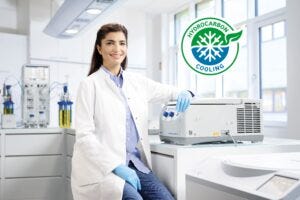
Eppendorf has launched the first centrifuge on the market to be deemed sustainable under the My Green Lab ACT label. We ask the firm what this means, and how it plays into wider sustainability goals.
The concept of sustainability has moved beyond a tick-box exercise within the bioprocess industry. Last year, vendors took note as pharma giant GSK launched a sustainability program calling on its network of over 160 suppliers to take action on sustainability commitments and make improvements on emissions, energy, heat, transport, waste, water and biodiversity.
As such, bioprocess vendor and lab suppler Eppendorf said last month its microcentrifuge with hydrocarbon cooling product ‘Centrifuge 5427 R’ is the first centrifuge to be awarded ACT label certification.

Image c/o Eppendorf
The ACT (Accountability, Consistency, Transparency) label is an accreditation scheme launched by non-profit My Green Lab in 2017 aimed at providing industry transparency about the environmental impact and recyclability of lab equipment.
BioProcess Insider wanted to know more, so we spoke with Eppendorf to understand what such accreditation really means and how it fits in with continued sustainability efforts.
BioProcess Insider (BPI): How big a deal is it for Eppendorf to be the first on the market to receive this accreditation?
Eppendorf: Eppendorf proudly supports sustainability aspects in the laboratories for many years. Based on our longterm-cooperation with My Green Lab since 2017, we decided to expand the portfolio of ACT-labeled products at My Green Lab. After ULT (Ultra Low Temperature) freezers and manual pipettes, we now received the ACT label for the first centrifuge worldwide. In close relationship with the My Green Lab team, we analyse new product groups for the ACT label. Due to our longterm experience with many different product groups at Eppendorf, we want to support the ACT label to expand the range of products with ACT label. Besides the well-known Centrifuge 5910 RI, we also received the ACT label for our CombiTips advanced recently.
BPI: How accredited is the ACT program, and why did Eppendorf select it over other sustainability programs available?
Eppendorf: The ACT program is – to our knowledge – the only global program for laboratory equipment which addresses sustainability aspects and product life aspects. In 2017, we were just a very small group of suppliers supporting My Green Lab. Today, most of the bigger suppliers of lab equipment participate and label products by ACT. On the customer side, many pharma accounts are asking for ACT labeled products and also academic accounts are interested. ACT is an independent third-party organization, providing user some independent validation of lab products.
BPI: How difficult was it for Eppendorf to adjust its materials and way of working to fulfil these sustainability criteria?
Eppendorf: Every new validation system requires some experience and adaptions. As Eppendorf is used to validations due to its ISO certifications of 9011 and 14001, we can benefit from this knowledge. For sure, there are some information about the products which required some more work as they were not documented in a way that My Green Lab was able to benefit from it. With every new ACT label process, we improve and optimize the process of data collection internally. Due to the close interaction with My Green Lab, all open tasks can easily be discussed until both parties have a common understanding.
BPI: What has been the cost for Eppendorf to change its ways to be greener and more sustainable and is this being picked up by its customers?
Eppendorf: The transformation of the company to become greener and more sustainable is a journey. In principle, we already started with this concept in 1945 when our founders stated their vision ‘to improve human living conditions.’ Similar to this, we focused on ergonomic design of our products already at least 20 years ago (PhysioCare concept). One of the first ULT freezers with green, hydrocarbon based cooling was launched 2008 by our freezer team. During the last years, there was a growing focus on classic sustainability topics. This includes the launch of our biobased tubes in summer 2022 as well as the change to 100% green contract power in all our factories (except Japan). Our goal to cut the carbon emissions in our own operations until 2028 is a challenging target for the next months and years.
Our customers appreciate this continuous adaption of Eppendorf.
BPI: So what’s next on Eppendorf’s sustainability journey?
Eppendorf: We will continue to improve our sustainability aspects. Short term, we will launch our first hydrocarbon-based refrigerated centrifuge. We will expand our biobased consumable portfolio. All these new steps require close interactions with our stakeholders, our customers. This journey can only be done in cooperation.
About the Author
You May Also Like

schedl_b_and_w.jpg?width=100&auto=webp&quality=80&disable=upscale)
schedl_b_and_w.jpg?width=400&auto=webp&quality=80&disable=upscale)


